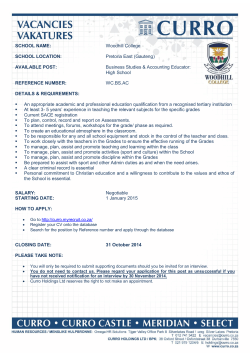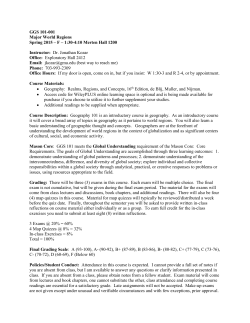
PSYCH 3BA3 POSITIVE PSYCHOLOGY
Psychology 3BA3: Positive Psychology Course Outline, Jan. - Apr. 2015 Time Mon., Thurs., 9:30; Tues. 10:30 am Classroom: TSH-120 Web site: http://intropsych.mcmaster.ca/psych3ba3 and on Avenue to Learn Instructor: Dick Day Office: Psych Bldg Room 404 Phone: 525-9140 ext. 23006 Email:dayrich@mcmaster.ca Course Objectives Positive psychology focuses on the nature, development, and impact of emotions, beliefs, and behaviors that lead to a heightened sense of personal satisfaction, and a more adaptive relationship to our social world. This contrasts with and complements abnormal psychology, which typically deals with emotions, beliefs, and behaviors that have a negative impact on our functioning. The objectives of this course include providing an introduction and fostering and understanding of ideas of theorists who have dealt with optimal human functioning, and acquainting you with the growing body of research evidence concerning the nature, development, maintenance, and individual and social effects of beliefs, emotions, and behaviors that have positive effects on our personal psychological state, and on our interaction with others. Required Text: Lopez, Pedrott & Snyder. Positive Psychology: The Science and Practical Explorations of Human Strengths, Third Edition. Sage Publications, 2015. Recommended Text: R. Day. Psych 3BA3 Handbook. McMaster Custom Courseware, 2014. Course Outline: The table below lists the topics we will be covering, and the probable order in which we will be covering them. The dates when each topic will be discussed are approximate. The order and exact contents of each topic area may change even after the course begins in January. Week of: Topic Readings Jan. 5 Introduction to Positive Psychology Chapters 1 and 4 Jan. 12 Jan. 19 Jan. 26 Positive States of Mind and Being (Maslow, Rogers, Csikszentmihalyi, Eastern psychologies) Chapters 2 and 10 * Feb. 2 Feb. 9 Feb. 23 Mar. 2 Positive Emotions (Happiness, or Subjective Well-Being) Chapters 6, 7, 12 Feb. 16 Break Week Mar. 9 * Mar. 16 Mar. 23 Mar. 30 Apr. 6 Positive Traits, Values, Virtues, and Attitudes (Self-esteem; Self-Efficacy; Meaningfulness; Optimism; Forgiveness, Gratitude) Classes end Wednesday, April 8th Exam Period Final Examination Chapters 3, 8 and 11 Evaluation: There will be two non-cumulative in-class tests, worth 30% each, and a final exam worth 40%. Each in-class test will consist of approximately 40 multiple-choice questions. You will have the first 60 minutes of the class period to complete each test. The cumulative final exam will consist of 80 multiple-choice questions. You will have two hours for this test, which will take place during the April examination period. The tentative dates for the in-class tests are as follows (and are marked on the course outline with an asterisk next to the date): In-class Test #1: Thursday, February 5th In-class Test #2: Thursday, March 19th Missed Work: If you miss one of the in-class tests for documented medical or compassionate reasons, you should complete a Missed Work form in the office of your Faculty’s Associate Dean. Once I have received notice of your absence, the remaining in-class test and the final exam will be reweighted (40%, 60%, respectively) to cover the missed in-class test. Discretionary notes will generally not be accommodated. Note also that the online student absence form (MSAF) can only be used once per term, only for medical absences, and only for assignments worth less than 30%. That means that an MSAF will not excuse you from either of the midterm tests in this course. Final Grade Calculation and Adjustment: The final mark in this course will be computed by applying the following formula to the percentage scores on Test1, Test2, and Final Exam: (Test1% x .30) - (Test2% x .30) - (Exam% x .40) = Final Course Mark Apart from excused absences from an in-class test, every student will be assessed using the weighting formula shown above - with one exception: In assigning final letter grades for the course I look at the pattern of performance over the two in-class tests and the final exam. If the overall average, as calculated by the formula above, is on the borderline of the next higher letter grade (e.g. 49%, 66%, or 84%) and if the marks on both one in-class test and the final exam are at the next higher level (e.g., D-, C+, A), then I will assign the next higher letter grade. Apart from this one final adjustment, final course grades in Psych 3BA3 are not changed unless they have been calculated incorrectly. Consequently, I do not respond to personal, phone, or email requests to reconsider correctly calculated final letter grades. Note that although midterm and exam marks, and final course averages are posted on Avenue as well as on the intropsych Grades Lookup, ONLY THE NUMERICAL POSTINGS ON THE GRADES LOOKUP REFLECT THE CORRECT CALCULATION OF YOUR MARKS AND FINAL AVERAGE. The letter grades posted on Avenue and the Grades Lookup will be identical, and equally correct. Academic Integrity and Academic Dishonesty: Academic dishonesty consists of misrepresentation by deception or by other fraudulent means and can result in serious consequences, e.g. the grade of zero on an assignment, loss of credit with a notation on the transcript (notation reads: “Grade of F assigned for academic dishonesty”), and/or suspension or expulsion from the university. It is your responsibility to understand what constitutes academic dishonesty. For information on the various kinds of a academic dishonesty please refer to the Academic Integrity Policy, specifically Appendix 3, located at http://www.mcmaster.ca/senate/academic/ac_integrity.htm The following illustrates only three forms of academic dishonesty: 1. Copying or using unauthorized aids on tests and examinations. 2. Plagiarism, e.g. the submission of work that is not one’s own or for which other credit has been obtained. 3. Improper collaboration in group work. Grading in Psychology 3BA3 Your final percentage marks in the course will be translated into a letter grade according to the usual equivalences listed in the 2014/2015 Undergraduate Calendar.
© Copyright 2025










